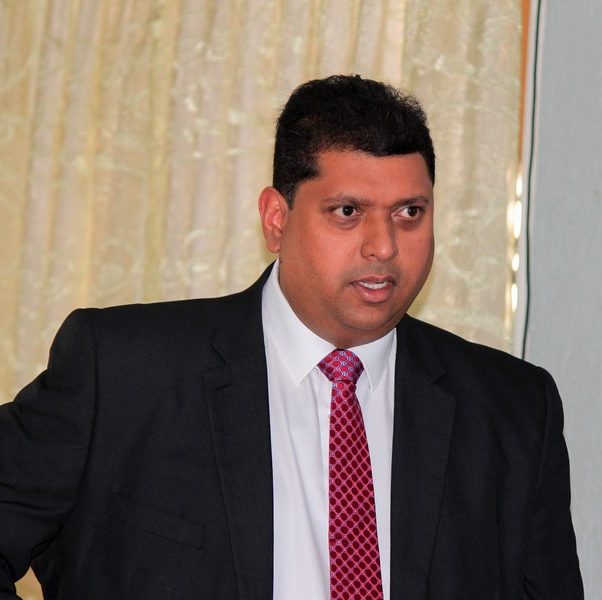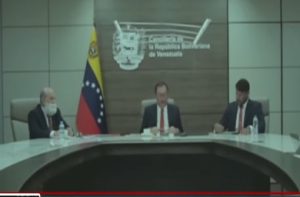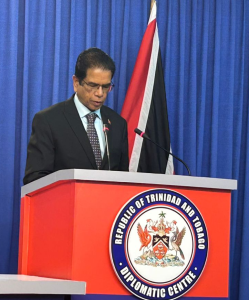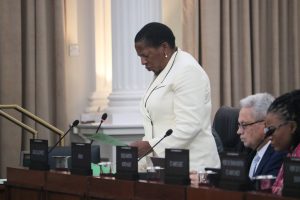By Kevin Ramnarine
LAST December, the prime minister described the license between Petroleos De Venezuela (PdVsa) and Shell/NGC as a “golden fleece”.
Previously he had invoked the tale of Sisyphus doomed as he was to roll a stone up a hill for all eternity, to describe the difficulties with the Dragon project.
When the license was finally awarded last December, there were reports that Dragon’s gas would be produced in two years. This seemed overly optimistic. The license came against the backdrop of an agreement between the Venezuelan Government and the Opposition Unitary Platform, signed in Barbados on October 17, 2023, to work towards free and fair elections in that beleaguered country. On the basis of the Barbados agreement, the United States issued general license 44 lifting sanctions on the Venezuelan oil and gas industry and specifically on PdVsa.

Yesterday, the US department of State said it may not renew general License 44 when it expires on April 18, 2024, unless all presidential candidates are allowed to contest the 2024 general election in Venezuela.
This sent shock waves through various WhatsApp chat rooms. The message being sent was “Dragon deal dead”. The move by the US came as no surprise.
The Venezuelan Supreme Court had, a few days before, rejected leading Opposition Presidential candidate María Corina Machado’s challenge to her disqualification from holding public office. In July 2023 when Secretary of State Antony Blinken visited Guyana he expressed his concerns about the disqualification of Machado.
Did our government take note of that position?
Does this mean the death of the Dragon deal? I have not seen the 2023 Office of Foreign Assets Control (OFAC) license that was issued to Trinidad and Tobago in relation to the Dragon development, but we are told it is specific to the Government of T&T, NGC, and Shell and their pursuance of the Dragon project.
Will the possible re-imposition of sanctions, on April 18, 2024, impact Dragon? I am sure the government will argue it will have no impact. However, even if it is argued that it will not impact on the terms of the 2023 OFAC license, it is inescapable that it will make it a lot more difficult for Shell and NGC to do business in a Venezuelan environment that is already one of the hardest places in the world to do business.
Moreover, if one were to totally remove all sanctions, it still remains very difficult to conduct an oil and gas business in Venezuela.
There is currently little or no drilling on land in Venezuela and they have not had an offshore drilling campaign for years. Investors remain wary of doing business in Venezuela. In addition, the conditions of the wells that were drilled in the Dragon field back in 2009 to 2010 are unknown.
They have been capped for 14 years. This means there is a good chance there would be a need for a drilling campaign. How long would that take to plan and execute? Then there are other considerations around infrastructure including a pipeline which necessitates surveys and studies of the bathymetry of the seafloor.
Then there are environmental clearances and seabed licenses. This is why the prediction of gas from Dragon in two years from the award of the license was unrealistic.
What are the consequences for Trinidad and Tobago? T&T, with its ailing natural gas sector cannot plan its business in anticipation of “the great hope” that is the Dragon project. The probability of Dragon gas landing on these shores remains low.
The Rowley administration made the Dragon deal the sine qua non of their energy policy agenda and expended significant time and monies on it. There is a chance that it will all come to naught. If so, where does that leave us? We still have the Shell Manatee project which is progressing towards final investment decision and from which natural gas is expected by early 2028.
However, Manatee only gets us back to 2023 levels of production.
There is also the deepwater Calypso project for which there is no official estimate for first gas.
Some industry sources speculate that to be 2030 to 2032. The question is what happens between 2024 and 2027? We are going to walk a very difficult economic path in these years as oil and gas production struggle and prices don’t seem encouraging given the global over supply of oil and natural gas. The difficulty of these years was alluded to by outgoing NGC President Mark Loquan.
The question many will ask is how did we get here? What policy actions or omissions led us to this point?
How did we come to a point where we saw Dragon and Nicholas Maduro as the great hope for T&T?
Should we not have been accelerating the development of our own deepwater natural gas resources?
Why did this government not award any new acreage for exploration for eight years? It seems the golden fleece will continue to elude Jason and Sisyphus will have to keep pushing his rock up the hill.
Kevin Ramnarine is a former Minister of Energy of Trinidad and Tobago. He can be reached at kevin.ramnarine@gmail.com

AZP News is an independent news organisation that is not affiliated with any big business and depends solely on advertising to pay our bills. Therefore, we are asking for the generosity of our readers to help us with small donations of any amount, but we will be happy with $10, $20 or $50. Click Here to Donate
![]()













